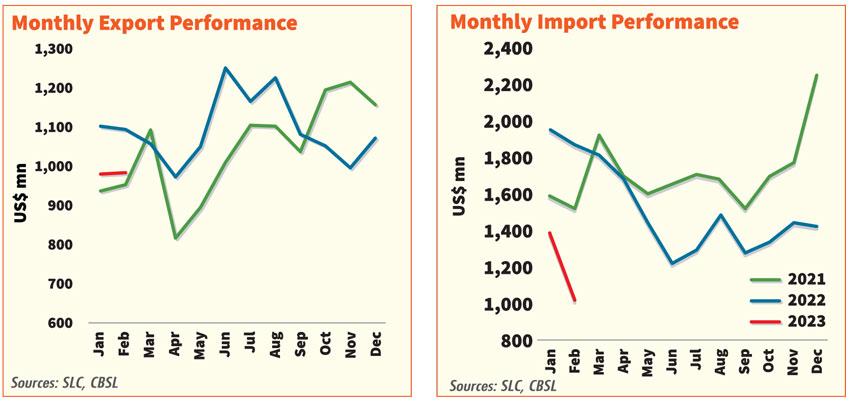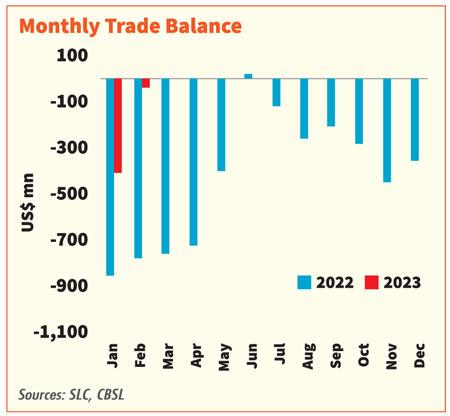01 Apr 2023 - {{hitsCtrl.values.hits}}

Sri Lanka’s deficit in the merchandise trade account witnessed a significant contraction in February, due to a significant moderation in the import expenditure, arising out of the aggregate demand conditions.
 The trade deficit narrowed significantly to US $ 39 million in February 2023, from US $ 780 million recorded in the corresponding period of the previous year, the data from the Economics Research Department of the Central Bank showed.
The trade deficit narrowed significantly to US $ 39 million in February 2023, from US $ 780 million recorded in the corresponding period of the previous year, the data from the Economics Research Department of the Central Bank showed.
Accordingly, the cumulative deficit in the trade account during the January-February 2023 period was US $ 449 million, a sizeable decline from US $ 1,636 million recorded over the same period in 2022.
Despite recording a marginal growth compared to January 2023, the earnings from the merchandise exports declined by 10.2 percent in February 2023 year-on-year to US $ 982 million. The export earnings were recorded below the US $ 1 billion level for the second consecutive month.
Although a decline in the earnings was observed across all main categories, the industrial exports mainly contributed to the overall contraction. The cumulative export earnings during January-February 2023 declined by 10.7 percent over the same period, last year.
On the merchandise imports, the expenditure almost halved in February 2023, at US $ 1,021 million, compared to February 2022. This is the lowest recorded imports since May 2020. All major import sectors declined while the decline in expenditure on intermediate goods was significant.
Meanwhile, the cumulative import expenditure during January-February 2023 also contracted by 37.1 percent over the corresponding period in 2022.
Driven by the lower expenditure on both food and non-food consumer goods, the expenditure on the importation of consumer goods in February 2023 dipped when compared with that of recorded in February 2022. The contraction in expenditure on non-food consumer goods was broad-based but the drop in imports of home appliances, household and furniture items and clothing and accessories was notable, the Central Bank said.
Further, the expenditure on food and beverages also declined, due to the lower imports of cereals and milling industry products (mainly, rice), compared to
February 2022.
The expenditure on intermediate goods also witnessed a decline in February 2023 when compared with the corresponding month of the previous year. This was driven by the lower imports of fuel, textiles and textile articles (primarily, fabrics). The importation of refined petroleum was significantly low, due to the build-up of inventories, while crude oil imports were not recorded in February 2023. The decline in textiles and textile articles was significant, implying a possible slowdown in garment exports in the period ahead, the Central Bank said.
While a sizable decline was recorded in the importation of base metals, chemical products, plastics and articles, rubber and articles and vehicle and machinery parts, an increase was noted in the expenditure on wheat, diamonds, precious stones and metals.
Similarly, the import expenditure on investment goods declined significantly in February 2023, compared to the same month in 2022, resulting from a decline in all three investment goods subcategories: machinery and equipment, building material and transport equipment.
24 Dec 2024 14 minute ago
24 Dec 2024 17 minute ago
24 Dec 2024 31 minute ago
23 Dec 2024 23 Dec 2024